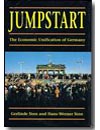The Economics of Target Balances: From Lehman to Corona
 Target balances are the largest single item in some of the balance sheets of the Eurosystem’s national central banks (NCBs), and yet very little is known about them by the general public and even by economists. This book shows that Target balances measure overdraft credits between the NCBs that resemble ordinary fiscal credit and which have grown disproportionately, exceeding one billion euros. There is, however, no parliamentary legitimation for the Target balances. The book sheds light on the economic significance of the balances, questions their limitlessness, and addresses controversial views that have been expressed regarding them. ... Read on
Target balances are the largest single item in some of the balance sheets of the Eurosystem’s national central banks (NCBs), and yet very little is known about them by the general public and even by economists. This book shows that Target balances measure overdraft credits between the NCBs that resemble ordinary fiscal credit and which have grown disproportionately, exceeding one billion euros. There is, however, no parliamentary legitimation for the Target balances. The book sheds light on the economic significance of the balances, questions their limitlessness, and addresses controversial views that have been expressed regarding them. ... Read on
Palgrave Macmillan 2020
The Euro Trap. On Bursting Bubbles, Budgets, and Beliefs
 This book offers a critical assessment of the history of the euro, its crisis, and the rescue measures taken by the European Central Bank and the community of states. The euro induced huge capital flows from the northern to the southern countries of the Eurozone that triggered an inflationary credit bubble in the latter, deprived them of their competitiveness, and made them vulnerable to the financial crisis that spilled over from the US in 2007 and 2008. As private capital shied away from the southern countries, the ECB helped out by providing credit from the local money-printing presses. The ECB became heavily exposed to investment risks in the process, and subsequently had to be bailed out by intergovernmental rescue operations that provided replacement credit for the ECB credit, which itself had replaced the dwindling private credit. The interventions stretched the legal strictures stipulated by the Maastricht Treaty which, in the absence of a European federal state, had granted the ECB a very limited mandate. These interventions created a path dependency that effectively made parliaments vicarious agents of the ECB's Governing Council. ... read on
This book offers a critical assessment of the history of the euro, its crisis, and the rescue measures taken by the European Central Bank and the community of states. The euro induced huge capital flows from the northern to the southern countries of the Eurozone that triggered an inflationary credit bubble in the latter, deprived them of their competitiveness, and made them vulnerable to the financial crisis that spilled over from the US in 2007 and 2008. As private capital shied away from the southern countries, the ECB helped out by providing credit from the local money-printing presses. The ECB became heavily exposed to investment risks in the process, and subsequently had to be bailed out by intergovernmental rescue operations that provided replacement credit for the ECB credit, which itself had replaced the dwindling private credit. The interventions stretched the legal strictures stipulated by the Maastricht Treaty which, in the absence of a European federal state, had granted the ECB a very limited mandate. These interventions created a path dependency that effectively made parliaments vicarious agents of the ECB's Governing Council. ... read on
MIT 2012
The Green Paradox. A Supply-Side Approach to Global Warming
 The earth is getting warmer. Yet, as Hans-Werner Sinn points out in this provocative book, the dominant policy approach - which aims to curb fossil energy consumption - has been ineffective. Despite policymakers’ efforts to promote alternative energy, impose emission controls on cars, and enforce tough energy efficiency standards for buildings, the relentlessly rising curve of CO2 output does not show the slightest downward turn. Some proposed solutions are downright harmful. Cultivating crops to make biofuels, for example, not only contributes to global warming but also consumes resources that should be devoted to feeding the hungry. In The Green Paradox, Sinn proposes a new, more pragmatic approach based not on regulating the demand for fossil fuels but on controlling the supply. ... read on
The earth is getting warmer. Yet, as Hans-Werner Sinn points out in this provocative book, the dominant policy approach - which aims to curb fossil energy consumption - has been ineffective. Despite policymakers’ efforts to promote alternative energy, impose emission controls on cars, and enforce tough energy efficiency standards for buildings, the relentlessly rising curve of CO2 output does not show the slightest downward turn. Some proposed solutions are downright harmful. Cultivating crops to make biofuels, for example, not only contributes to global warming but also consumes resources that should be devoted to feeding the hungry. In The Green Paradox, Sinn proposes a new, more pragmatic approach based not on regulating the demand for fossil fuels but on controlling the supply. ... read on
Oxford University Press 2010
Casino Capitalism - How the Financial Crisis Came About and What Needs to be Done Now
 The updated and revised English edition of Hans-Werner Sinn’s book Kasino-Kapitalismus: Wie es zur Finanzkrise kam, und was jetzt zu tun ist (Econ 2009; revised paperback edition Ullstein 2010) was published by Oxford University Press in August 2010. Hans-Werner Sinn explains how the financial system became a casino for gamblers and analyses the reasons for the crisis: the failings of the rating agencies, the regulating authorities and the banks. He points out the flaws in the economic rescue packages and presents a master plan for the reform of financial markets. ... read on
The updated and revised English edition of Hans-Werner Sinn’s book Kasino-Kapitalismus: Wie es zur Finanzkrise kam, und was jetzt zu tun ist (Econ 2009; revised paperback edition Ullstein 2010) was published by Oxford University Press in August 2010. Hans-Werner Sinn explains how the financial system became a casino for gamblers and analyses the reasons for the crisis: the failings of the rating agencies, the regulating authorities and the banks. He points out the flaws in the economic rescue packages and presents a master plan for the reform of financial markets. ... read on
Ifo Institute 2009
Food for Thought - 100 Theses from the Ifo Institute
 In these 100 "Viewpoint" on economic policy, Hans-Werner Sinn presents his reform ideas for Germany. These short and to-the-point contributions to the economic policy debate were written during the first ten years of his presidency at the Ifo Institute and provide the reader with a short introduction to a topic in economics. ... read on
In these 100 "Viewpoint" on economic policy, Hans-Werner Sinn presents his reform ideas for Germany. These short and to-the-point contributions to the economic policy debate were written during the first ten years of his presidency at the Ifo Institute and provide the reader with a short introduction to a topic in economics. ... read on
Ifo Institute 2009
Risk Taking, Limited Liability, and the Banking Crisis
 The volume includes theoretical articles on banks’ liability restrictions, on the possible causes of the banking crisis and economic-policy recommendations on banking regulation by Hans-Werner Sinn in the past three decades. ... read on
The volume includes theoretical articles on banks’ liability restrictions, on the possible causes of the banking crisis and economic-policy recommendations on banking regulation by Hans-Werner Sinn in the past three decades. ... read on
MIT Press 2007
Can Germany Be Saved? The Malaise of the World's First Welfare State
 What has happened to the German economic miracle? Rebuilding from the rubble and ruin of two world wars, Germany in the second half of the twentieth century recaptured its economic strength. High-quality German-made products ranging from precision tools to automobiles again conquered world markets, and the country experienced stratospheric growth and virtually full employment. Germany (or West Germany, until 1989) returned to its position as the economic powerhouse of Europe and became the world’s third-largest economy after the United States and Japan. But in recent years growth has slowed, unemployment has soared, and the economic unification of eastern and western Germany has been mishandled. Europe’s largest economy is now outperformed by many of its European neighbors in per capita terms. In Can Germany Be Saved?, Hans-Werner Sinn, one of Germany’s leading economists, takes a frank look at his country’s economic problems and proposes welfare- and tax-reform measures aimed at returning Germany to its former vigor and vitality. ... read on
What has happened to the German economic miracle? Rebuilding from the rubble and ruin of two world wars, Germany in the second half of the twentieth century recaptured its economic strength. High-quality German-made products ranging from precision tools to automobiles again conquered world markets, and the country experienced stratospheric growth and virtually full employment. Germany (or West Germany, until 1989) returned to its position as the economic powerhouse of Europe and became the world’s third-largest economy after the United States and Japan. But in recent years growth has slowed, unemployment has soared, and the economic unification of eastern and western Germany has been mishandled. Europe’s largest economy is now outperformed by many of its European neighbors in per capita terms. In Can Germany Be Saved?, Hans-Werner Sinn, one of Germany’s leading economists, takes a frank look at his country’s economic problems and proposes welfare- and tax-reform measures aimed at returning Germany to its former vigor and vitality. ... read on
Edward Elgar 2006
Redesigning the Welfare State: Germany's Current Agenda for an Activating Social Assistance
together with Christian Holzner, Wolfgang Meister, Wolfgang Ochel, Martin Werding
 Redesigning the Welfare State argues that the current high level of unemployment in Germany not only creates a major challenge for the German welfare state, but is to a good extent caused by the way the country's welfare system is designed. The authors review the public debate on labour market reforms, which has been ongoing since 2002, and discuss the first set of reforms that have been enacted since then. As the reforms carried out so far fall short of what is actually needed to increase employment and economic growth in the Eurozone’s largest economy, the authors introduce a proposal for a more fundamental redesign of the German welfare state. ... read on
Redesigning the Welfare State argues that the current high level of unemployment in Germany not only creates a major challenge for the German welfare state, but is to a good extent caused by the way the country's welfare system is designed. The authors review the public debate on labour market reforms, which has been ongoing since 2002, and discuss the first set of reforms that have been enacted since then. As the reforms carried out so far fall short of what is actually needed to increase employment and economic growth in the Eurozone’s largest economy, the authors introduce a proposal for a more fundamental redesign of the German welfare state. ... read on
Basil Blackwell 2003
The New Systems Competition
 Competition between companies tends to be beneficial for the general public, but is this also true for competition between States in a world with global financial markets, low transport costs, and increasing migration? In this book, Hans-Werner Sinn provides a solid economic analysis of the competitive forces at work and addresses how we should organize competition between systems so they will enhance the efficiency of these systems, as opposed to acting destructively on them. ... read on
Competition between companies tends to be beneficial for the general public, but is this also true for competition between States in a world with global financial markets, low transport costs, and increasing migration? In this book, Hans-Werner Sinn provides a solid economic analysis of the competitive forces at work and addresses how we should organize competition between systems so they will enhance the efficiency of these systems, as opposed to acting destructively on them. ... read on
Edward Elgar 1999
The German State Banks. Global Players in the International Financial Markets
 Does anyone know what the landesbanks are? No, they are not the branches of the Bundesbank. They are the central banks of the länder - the German states. The landesbanks are public banks and they operate in the same areas of banking as the private banks. The landesbanks are not only some of the biggest banks in Germany, they also dominate the German international banking sector. Protected by the German taxpayers' seemingly bottomless pockets, they are able to take part in financing the very biggest projects anywhere in the world. They are Germany's global players in the international financial markets. ...read on
Does anyone know what the landesbanks are? No, they are not the branches of the Bundesbank. They are the central banks of the länder - the German states. The landesbanks are public banks and they operate in the same areas of banking as the private banks. The landesbanks are not only some of the biggest banks in Germany, they also dominate the German international banking sector. Protected by the German taxpayers' seemingly bottomless pockets, they are able to take part in financing the very biggest projects anywhere in the world. They are Germany's global players in the international financial markets. ...read on
MIT 1992
Jumpstart. The Economic Unification of Germany
together with Gerlinde Sinn
 The unification of Germany is one of the most wrenching and dramatic transitions in economic history. In Jumpstart, two well-known German economists synthesize a vast body of literature to present the first well-structured, clearly argued account of the reunification process and the policy alternatives. The Sinns discuss currency conversion, privatization and its ensuing problems, and wage policies. They propose a participation model that will speed economic recovery, and they recommend gradual changes in the price structure and rapid increases in wages - strategies that are offered as an “escape route” from the economic path Germany is now on. ... read on
The unification of Germany is one of the most wrenching and dramatic transitions in economic history. In Jumpstart, two well-known German economists synthesize a vast body of literature to present the first well-structured, clearly argued account of the reunification process and the policy alternatives. The Sinns discuss currency conversion, privatization and its ensuing problems, and wage policies. They propose a participation model that will speed economic recovery, and they recommend gradual changes in the price structure and rapid increases in wages - strategies that are offered as an “escape route” from the economic path Germany is now on. ... read on